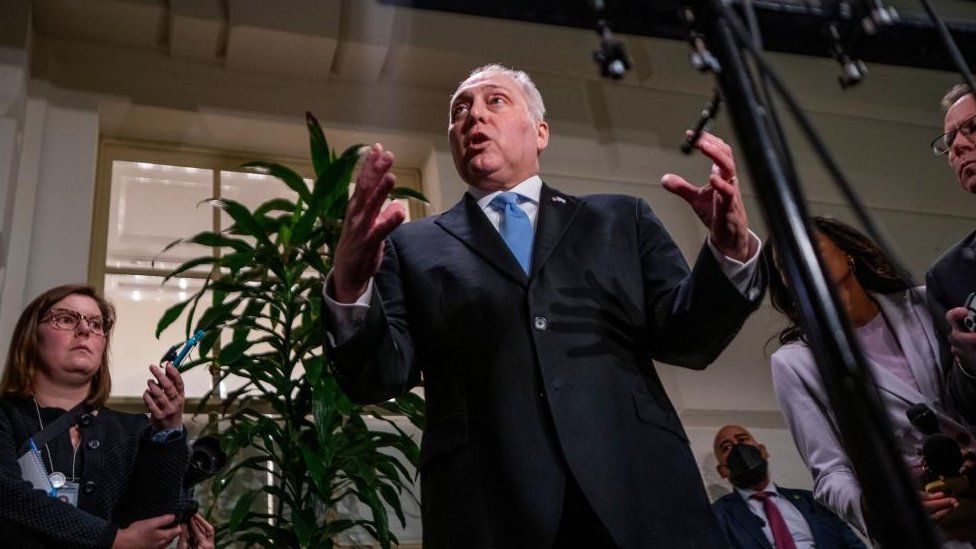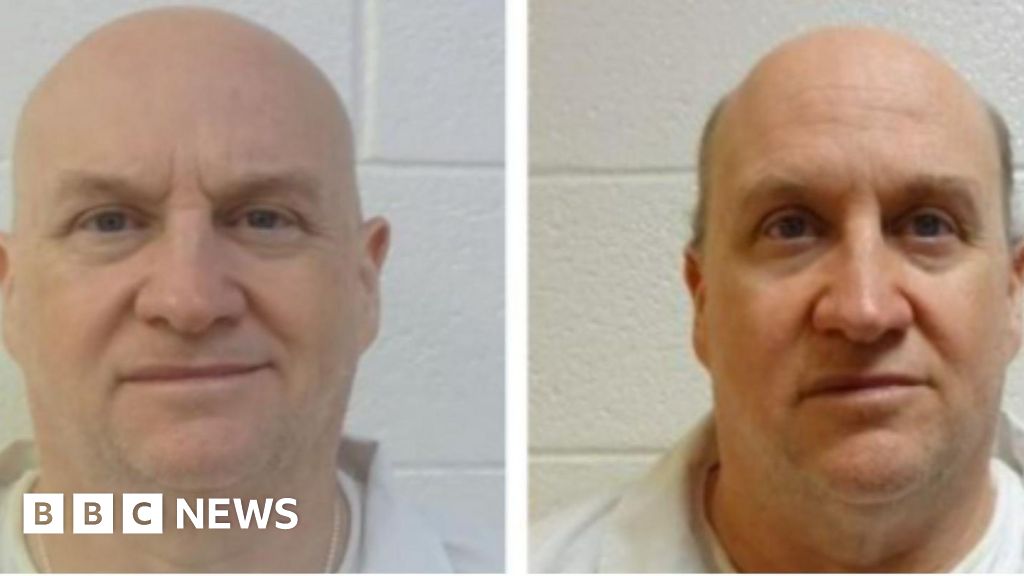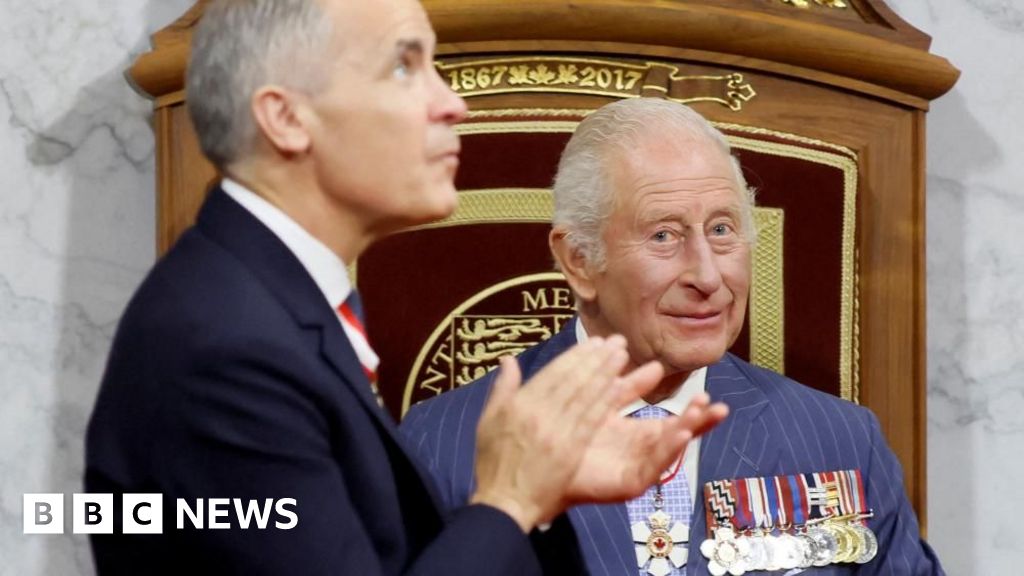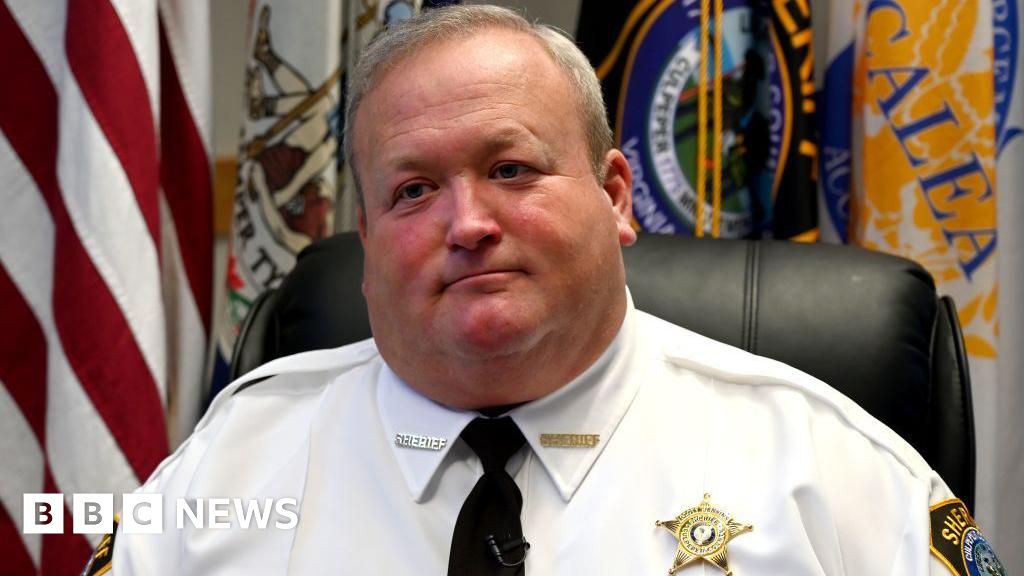ARTICLE AD BOX
 Image source, Reuters
Image source, Reuters
Steve Scalise has so far failed to secure the votes he needs to become Speaker of the House.
By Bernd Debusmann Jr on Capitol Hill
BBC News
A day after being chosen as the Republican party's nominee to be Speaker of the House of Representatives, Steve Scalise stands no closer to getting the job.
After beating right-wing hardliner Jim Jordan to get the backing of his party, Mr Scalise has seen support erode as House Republicans are beset by infighting.
As things stand, he seems to be well short of being able to secure the majority he needs in the full House to become Speaker.
That leaves a vacuum at the very top of the US government and means the lower chamber of Congress is unable to function.
The road blocks
Mr Scalise seems plagued by the same issues that vexed former Speaker Kevin McCarthy until he was overthrown last week.
The Republicans control the House but with a narrow majority.
To successfully secure the votes needed to win a floor vote, Mr Scalise needs 217 of 221 Republican representatives (House members) to vote for him. It only takes five rebels to torpedo his leadership ambitions.
The momentum, however, is going against him.
A growing number of representatives have said they will not vote for him. A few, like Florida's Anna Paulina Luna, have gone from being "yes" votes on Wednesday to "no" votes on Thursday.
The holdouts have given a variety of reasons.
Kentucky's Thomas Massie, for example, has said that he believes Mr Scalise has "not articulated a viable plan" for a spending bill which could avert a government shutdown.
Another representative, South Carolina's Nancy Mace, said she cannot support Mr Scalise because of a speech he gave to a group affiliated with the Ku Klux Klan in 2002, an appearance he later said he regretted.
Others have simply said they are against the "status quo" - or simply refuse.
"I'm now declaring I'm an 'ANYONE but Scalise'," New York's George Santos wrote on social media. "Come hell or high water I won't change my mind".
The exit routes
1. Scalise reaches 217 votes
This has, so far, proven difficult despite feverish behind-the-scenes efforts.
Speaking to reporters on Thursday, Mr Scalise said that while support continues to grow after a productive hours-long meeting, he is "not cutting any deals" to overcome lingering resistance.
"I want to meet in front of our members, answer every question and just continue to work through to unite... and address issues as they come up".
Several Representatives, however, have said that they believe it will be difficult for Mr Scalise to sway some of the holdouts.
Among them was ex-Speaker McCarthy, who told reporters his former number two faces "a big hill" to do so.
Another proposal would see the House's acting Speaker, Patrick McHenry, be given additional powers for a temporary period.
This would allow the House to function - and avoid a government shutdown in a month's time - while a longer-term solution is found. This would require some cooperation from Democrats to work out the details.
"It's important that we get back to the business of running this country," Ohio Representative James Joyce said of that option, according to the Washington Post.
Some lawmakers have expressed discomfort with the plan.
"Members want this resolved," Florida's Byron Donalds told reporters after the closed-door party meeting. "I think a... caretaker is not what members are interested in, and frankly I agree."
He said he believes a temporary speaker would not be effective amid ongoing negotiations over the budget and other issues.
3. Democrats to the rescue
A third option would be for Republicans to agree with Democrats on a consensus Republican candidate.
This option, however, would mean concessions be made to the minority party. Democrats want to eliminate a new rule introduced in January that gives any member the power to bring a vote to the floor to overthrow the Speaker.
Image source, Reuters
Image caption,Minority Leader Hakeem Jeffries has suggested that Democrats are willing to work with Republicans to end the deadlock
"We are ready, willing and able to find bipartisan common ground," Minority Leader Hakeem Jeffries said on Thursday. But that requires Republican partners, he added.
"It means partnering to re-open the house to get the business of the American people done. And changing the rules that were enacted in January that empower their most extreme members".
Some lawmakers, including Democrat Alexandria Ocasio-Cortes, have suggested that five Republicans could switch sides and vote for Mr Jeffries to become Speaker.
Whether this has enough support among rank-and-file Republicans remains to be seen, but it seems very unlikely.
The potential crash
A vacancy in one of the most important roles in US government comes at a bad time.
Without a Speaker, the chamber is unable to pass any bills or approve White House requests for emergency aid. That includes help for Israel amid its ongoing fight with Hamas.
A leaderless House also means that Congress is unable to pass any spending bills - even short-term measures - that would allow the government to avoid a potential government shutdown in mid-November.
On Thursday, several members of the House suggested a solution is unlikely until early next week.
What exactly that looks like remains an open question.

 1 year ago
35
1 year ago
35








 English (US) ·
English (US) ·